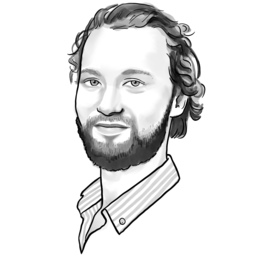
“Rural areas’ negativity on immigration and EU unchanged, while urbanites more positive”
The gap between the Randstad and rural areas has increased in the Netherlands over the past decade. “But differences between educational groups, for example, are much greater.” We posed five questions to Twan Huijsmans, who this Thursday afternoon will receive his doctorate on the political divide between city and countryside.
Especially in Anglo-Saxon countries, the electoral differences between urban and rural areas have increased significantly over the past 40 or 50 years, PhD candidate Twan Huijsmans observes. These differences are stark in the U.S., where the two-party system seems almost symbolic of this schism. The Republicans draw many voters from the countryside, the Democrats from the city.
But the Netherlands, too, is seeing a greater separation between urban and rural areas, Huijsmans notes, particularly in the past decade. He researched this phenomenon for his dissertation “Our Place in Politics: Urban-rural Political Divergence and How Place Affects Political Attitudes.” This Thursday afternoon, he will receive his doctorate from the UvA in the Agnietenkapel.
For his dissertation, Huijsmans used data from the National Voters Survey and other sources, taking into account differences in education level, income, and age. What did he find? Here are five themes from his research.
How have these differences between (big) cities and the countryside been reinforced in the Netherlands?
“There are various explanations for this, but the following one is important. Parties that do well in the city are often left-leaning and progressive, while in the countryside they are conservative or Christian. What is happening in the Netherlands now is that support for the big centrist parties, meaning the VVD and PVDA, has declined over the past decade. They provided a connection between urban and rural areas because they have a weaker geographical concentration of voters.

What was the strongest difference between urban and rural areas that stood out in your research?
“What stood out was that residents of large cities—partly due to globalization—have come to think more positively than before about important political issues such as immigration, the EU, and multiculturalism. At the same time, the opinion of people outside the big cities has remained about the same. You often hear that the latter group has started to think more negatively about this, but I didn't see that reflected in my analysis. So that was kind of a surprise.”
“Besides, the differences between urban and rural areas are not at all as big as we often think. Differences between educational groups, for example, are much larger, and they also exist within urban and rural areas.”
Where have these increasingly divergent views led?
“People who live in rural areas feel that national politics does not pay enough attention to their region. They feel that their local way of life and culture is not respected by others. For example, I
looked at local dialects. And what did I find? The further away they are from what we in the Randstad call “standard Dutch,” the stronger the feeling that national politics is not there for them. As a result, they are driven to right-wing parties such as the PVV, NSC, and BBB which are more successful at tapping into the sense of regional inequality in politics.”
So should they become progressive leftists in rural areas, just like in the city?
“No, certainly not. But on the right, there is also a party with anti-democratic views, namely the PVV. But if citizens flock to that radical-right party, it is problematic for the functioning of the rule of law.”
What is the solution? How can we (somewhat) close the urban-rural divide?
“It would be good if policymakers invested more in regions that have not benefited as much from economic change as the big cities have. Parties should also put more politicians from outside the Randstad on their list of candidates for the House of Representatives so that people in all corners of the country feel that they are represented in national politics.”
Twan Huijsmans' dissertation is called “Our Place in Politics: Urban-rural Political Divergence and How Place Affects Political Attitudes.” He will receive his doctorate on Thursday at 1:00 p.m. in the Agnietenkapel.

